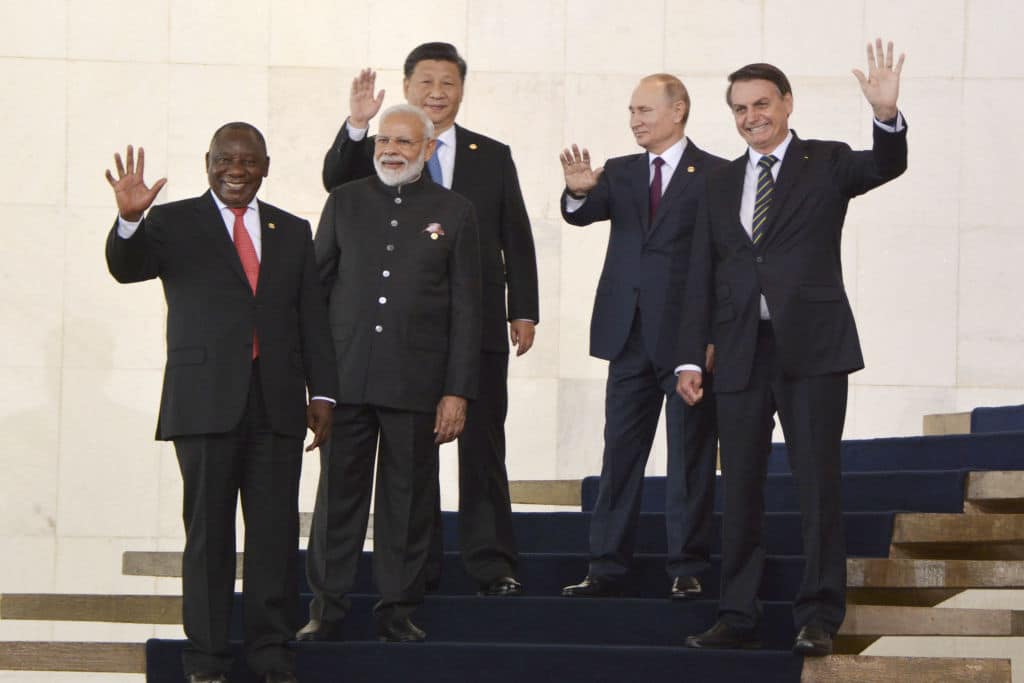Among the key topics to be addressed at the BRICS Summit in August are the expansion of the bloc, a common currency within it, and ensuring food and energy security.
After three years of virtual summits, South Africa is hosting in person the 15th BRICS Summit at the Sandton Convention Centre in Johannesburg from August 22 to 24.
An acronym for the world economies of Brazil, Russia, India, China, and since 2010, South Africa, BRICS, according to Trevor Bester, CEO of BRICS Global Television Network (expected to launch on August 20), “is a continuation of a vision established in 2010 as a platform to trade with a common currency, decreasing reliance on the dollar as the global reserve currency. The fastest-growing economies joined together to become the dominant global economies by 2050”.
The summit comes at a vital time in the alliance’s history as more than 20 countries have expressed interest in joining. None is more certain than Saudi Arabia, largely because of its interest in funding the BRICS Bank.
This will have massive positive implications for the emerging economies in the bloc and their development.
Iran is also likely to be accepted. It has embraced the global south and expressed its desire to eliminate Western dominance, one of the goals of BRICS, and will not hesitate to embrace and assist in de-dollarization efforts.
The United Arab Emirates, Indonesia, Bangladesh, Argentina and Egypt all stand a chance of also being accepted and bring with them varying benefits.
Among the key topics to be addressed at the summit are the expansion of BRICS, a common currency within the bloc and ensuring food and energy security.
“BRICS already accounts for 31.5% of global GDP and by 2030 will account for 50%. China is the fastest-growing economy at the moment but India is likely to take over,” says Bester.
“BRICS countries’ combined population is at 3.24 billion, which represents almost half the world’s population and have a combined GDP of $26.03 trillion. This, combined with the gradual decrease of unemployment in the BRICS countries from 4.8% in 2022 to 4.7% in 2023, illustrates the progressive nature of the concerned economies.”
The New Development Bank, formerly referred to as the BRICS Development Bank, established in 2014, offers member countries a platform to trade with each other in either local currency or a new currency backed by gold.
“The benefits of this bank, amongst others, is to finance infrastructure and sustainable development projects in emerging markets and countries,” says Redge Nkosi, Executive Director and Head of Research at Firstsource Money and Monetary Reform, to FORBES AFRICA.
“BRICS members will be able to achieve a level of self-sufficiency in international trade.”
The move could make it easier for economies to take on the US dollar and challenge its global reserve status.
In the last 18 months, BRICS nations have increased their gold buying expenditure and are stockpiling the precious metal.
The dollar is now a risky asset as it comes with the dangers of debt. If the debt ceiling crisis worsens, it could cause a domino effect of financial problems in developing countries. Therefore, a handful of countries in Asia,
Africa, Latin America, and Europe are looking to stay away from the dollar for global settlements.
For Africa, this is an opportunity. In recent years, BRICS has expanded its involvement on the continent. BRICS members are now Africa’s largest trading partners and significant investors, especially in the manufacturing and service sectors.
Pursued properly, BRICS participation can position South Africa and other African countries as being among the world’s fastest-growing economies.
Pravin Maharaj, Chairman of Trade BRICS, believes that by South Africa hosting the summit, “the time for Africa has arrived, it has moved from vision to reality”.
“The summit will focus on bringing about less poverty, less inequality and more development. Youth will have more to look forward to as education is also a key focus area at the summit,” he says to FORBES AFRICA.
